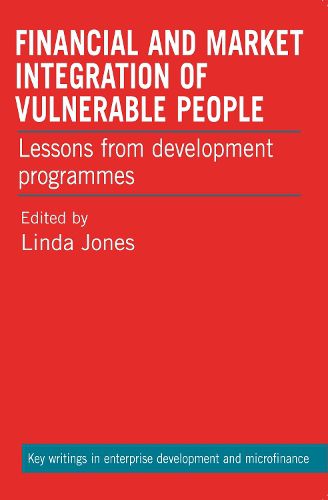Readings Newsletter
Become a Readings Member to make your shopping experience even easier.
Sign in or sign up for free!
You’re not far away from qualifying for FREE standard shipping within Australia
You’ve qualified for FREE standard shipping within Australia
The cart is loading…






This title is printed to order. This book may have been self-published. If so, we cannot guarantee the quality of the content. In the main most books will have gone through the editing process however some may not. We therefore suggest that you be aware of this before ordering this book. If in doubt check either the author or publisher’s details as we are unable to accept any returns unless they are faulty. Please contact us if you have any questions.
Smallholder farmers, women earners, young job-seekers, people with disability and the entrenched poor often struggle to sustain themselves or contribute to the wellbeing of their households. Despite years of attempting to address this situation, microfinance and enterprise development programmes have repeatedly been unable to reach the poorest and most vulnerable. However, some programmes and approaches are making advances, and this book provides conceptual and practical insights into how we can facilitate change for those most in need. It poses questions such as: how can we enable the participation and contribution of vulnerable populations in economic development programming? In what ways are subsidies being used creatively to increase assets without creating dependence? How can barriers to access for disabled people be reduced for greater financial inclusion? Is it possible for smallholders to be integrated into commercial value chains without increasing their risks? Which graduation models help poorest people to move out of extreme poverty? Financial and Market Integration of Vulnerable People provides examples of some promising solutions including the ‘push-pull’ model for value chain integration,, innovation in financial product design, cash transfers and graduation models, indigenous stewardship of local resources, and vouchers for smallholder agricultural technologies. This book is important reading for policy makers, programme implementers, ,researchers, and students of international development.
$9.00 standard shipping within Australia
FREE standard shipping within Australia for orders over $100.00
Express & International shipping calculated at checkout
This title is printed to order. This book may have been self-published. If so, we cannot guarantee the quality of the content. In the main most books will have gone through the editing process however some may not. We therefore suggest that you be aware of this before ordering this book. If in doubt check either the author or publisher’s details as we are unable to accept any returns unless they are faulty. Please contact us if you have any questions.
Smallholder farmers, women earners, young job-seekers, people with disability and the entrenched poor often struggle to sustain themselves or contribute to the wellbeing of their households. Despite years of attempting to address this situation, microfinance and enterprise development programmes have repeatedly been unable to reach the poorest and most vulnerable. However, some programmes and approaches are making advances, and this book provides conceptual and practical insights into how we can facilitate change for those most in need. It poses questions such as: how can we enable the participation and contribution of vulnerable populations in economic development programming? In what ways are subsidies being used creatively to increase assets without creating dependence? How can barriers to access for disabled people be reduced for greater financial inclusion? Is it possible for smallholders to be integrated into commercial value chains without increasing their risks? Which graduation models help poorest people to move out of extreme poverty? Financial and Market Integration of Vulnerable People provides examples of some promising solutions including the ‘push-pull’ model for value chain integration,, innovation in financial product design, cash transfers and graduation models, indigenous stewardship of local resources, and vouchers for smallholder agricultural technologies. This book is important reading for policy makers, programme implementers, ,researchers, and students of international development.